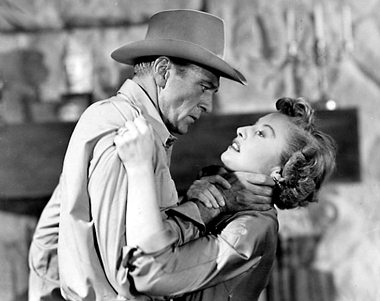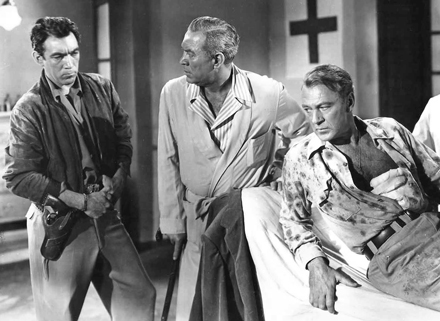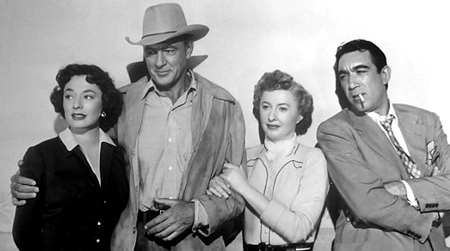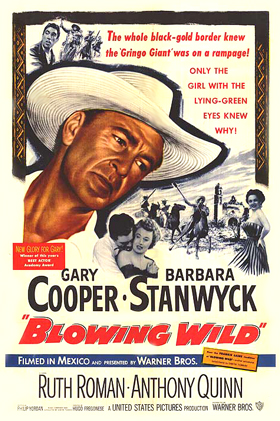
 |
|
|
|
Releasing through Warner Bros., independent producer Milton Sperling continued packaging big stars for the screen in Blowing Wild, a highly unoriginal story resting on the popularity of Gary Cooper and Barbara Stanwyck. It was the first of three Mexican-filmed westerns in a row for Cooper, who would soon return for Henry Hathaway's CinemaScope Garden of Evil and Robert Aldrich's precociously cynical Vera Cruz. Audiences in 1953 must have been surprised to see Blowing Wild purloin entire plotlines from previous popular movie hits. 
In a South American jungle, swarthy bandits drive wildcat oilmen Jeff Dawson and Dutch Peterson (Gary Cooper & Ward Bond) off their leased drilling operation, blowing up their rig when they can't pay extortion money. Back in town and broke, the men run into a similarly marooned American woman Sal Donnelly (Ruth Roman), but also their old pal Paco Conway (Anthony Quinn), who is now settled and rich and offers them both jobs. But Jeff's headstrong wife Marina (Barbara Stanwyck) is convinced that Jeff, her previous lover, has returned to strike up a new romance. Jeff and Dutch instead hire on to drive a truck full of nitroglycerin for the shady Jackson (Ian MacDonald). They barely survive another bandit attack and Dutch is wounded, so Jeff has little choice but to become Paco's new well boss. Marina immediately causes trouble. She becomes more brazen in her desires and won't take no for an answer. Jeff tries to fend off Marina as his relationship with Sal blooms. Paco begins to realize what's going on just as the bandits decide to attack his oil camps. Producer Sperling assembled a fine production in Blowing Wild but was surely cheated on the screenplay. Even a casual moviegoer will realize that Blowing Wild replays early chapters of The Treasure of the Sierra Madre. When Barbara Stanwyck enters, it runs a variation on Double Indemnity. Jeff and Dutch languish in a Mexican town just as had Humphrey Bogart in Treasure. Ward Bond even accosts a 'fellow American' in a white suit for a handout. When a crooked contractor cheats them, Jeff must start a fistfight in a bar to get his money. As if that were not enough, the premise of H.G. Clouzot's The Wages of Fear is boiled down to a single chapter -- Jeff and Dutch risk their lives transporting high explosives across dangerous roads. Writer and consummate dealmaker Philip Yordan was at this time still running a script mill and at times fronting for blacklistees. He assigned writers to revise scripts anonymously, for movies that often bore his writing credit alone. Determining which Yordan-signed movies Yordan personally wrote can be difficult. 
The triangle between Jeff, Marina and Paco starts off well, with the flamboyant husband blind to the fireworks between his wife and his best friend. Paco drinks too much and treats Stanwyck too roughly, while Jeff firmly rebuffs Marina's direct advances. As it turns out, Marina only thinks that she's in a Double Indemnity situation. She has already seduced Jeff's predecessor, a fat guy who was glad to quit. The extent of Marina's frustration can be measured by the many energetic horse rides she takes... all that energy has to go somewhere. She eventually resorts to a violent, gruesome murder. Gary Cooper's Jeff is consistent but somewhat colorless. People around him collapse in self-doubt, go crazy or are shot dead, but Jeff registers few emotional trials. He also proves to be impervious to fistfights, bandit attacks and the occasional oil well explosion. Jeff doesn't change, so we instead watch the pattern of stains and oil splotches on his dirty shirt. They migrate so frequently that we find ourselves looking out for continuity mismatches. The picture enlivens a bit whenever Cooper's Jeff interacts with Ruth Roman's Sal, a character that also seems borrowed from elsewhere. Over at Howard Hughes' RKO, Jane Greer and Jane Russell both played sexy adventuresses stranded South of the border, looking for the right man to bail them out. This is an exceptional oil well movie in that nobody strikes oil. In place of a gusher, the 'Blowin' Wild" of the title refers to an episode where Jeff and Paco put a torpedo bomb down a drilling shaft to blast through a tough stratum of rock. They hit water after the torpedo is in place, which prompts Jeff to wait up top for the torpedo to shoot up out of the pipe. It's red-hot and slippery, and if Jeff drops it it'll explode. This of course means yet more unruly grease stains on that dirty shirt. 
The film's location is clearly Mexico, with the bandit chief and his minions modeled on those of Treasure of the Sierra Madre. But a title card up front identifies the setting as "South America," clearly to mollify the local film censors, which were defensive about Mexico's national image. The title change fooled nobody, but it allowed producer Sperling to film a script that implies that the Mexican civil authorities permit lawless bandits to loot the countryside unopposed ... in the 1950s. The movie also gives the false impression that most Mexican oil is owned and developed by American companies. Friction between Mexican studios and bargain-hunting American producers would reach a peak two years later when Burt Lancaster's Vera Cruz company broke all the rules and ignored their hosts' protests. Payback came in 1960 when Walter Mirisch's The Magnificent Seven found itself filming in Mexico under restrictive, almost punitive, supervision. Blowing Wild's one glowing grace is Dimitri Tiomkin's emphatic music score, which plays up the fateful aspect of the seductive Marina. Just as he did for High Noon, Tiomkin wrote a country-western title tune (The Ballad of Black Gold) to be reprised at intervals throughout the show. In this case the inimitable Frankie Laine belts out an overwrought, obsessive ballad about the irresistible leading lady:
Laine puts a special stress on practically every word, to delirious effect. It's more dementedly extreme than the spoof tune Laine sang for Mel Brooks' Blazing Saddles twenty years later. Long after the dramatic appeal of Blowing Wild fades, the music makes it a thoroughly enjoyable show. 
Argentine-born director Hugo Fregonese worked all over the world, gaining his entry into Hollywood ranks by signing on as a technical advisor for a movie about Gauchos. His American films include the Civil War story The Raid, a fascinating rumination on the gray area between guerilla warfare and terrorism. Blowing Wild is hampered by a derivative script, but Fregonese's direction always focuses tightly on the character interaction. Olive Films' Blu-ray of Blowing Wild is an excellent flat encoding of this handsomely shot B&W film. Cinematographer Sid Hickox started out in 1916; just a year later he left feature films for less demanding work in television. I've seen at least one article that listed the original theatrical release of Blowing Wild in WarnerPhonic stereo sound. Olive Films' transfer is monaural and flat full frame. Although the main title blocks are composed for widescreen, it's difficult to decide if it was composed in the camera for 1:66 or 1:85. Compositions look pretty comfortable full frame, most of the time.
One shot near the beginning of the show demonstrates that a piece of original negative for Blowing Wild was lost or damaged during production. As Jeff and Dutch wander through a Blowing Wild was out on Republic VHS and I still have an old Republic laserdisc. This sparkling Blu-ray will be a must for fans of the film, Dimitri Tiomkin and Frankie Laine.
On a scale of Excellent, Good, Fair, and Poor,
Blowing Wild Blu-ray rates:
Reviews on the Savant main site have additional credits information and are often updated and annotated with footnotes, reader input and graphics.
Review Staff | About DVD Talk | Newsletter Subscribe | Join DVD Talk Forum |
| ||||||||||||||||||